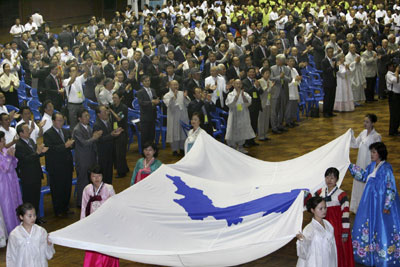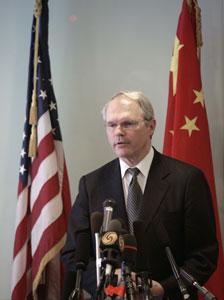N.Korea plans to shut reactor in July
(Reuters/Xinhua)Updated: 2007-06-18 17:03
BEIJING - North Korea plans to seal its main nuclear reactor and source of weapons-grade plutonium in the second half of July, Russia's Interfax news agency reported on Monday, citing an unidentified North Korean diplomatic source.
 South and North Korean women carry a "unification flag" signifying the Korean peninsula during the Grand Celebration for National Unification in Pyongyang June 17, 2007. [Reuters]  |
"So we are counting on sealing it (the reactor) in the second half of July, in accordance with the agreements reached at the six-party talks," the source said.
The report comes as North Korea said at the weekend it has invited UN nuclear inspectors into the country as part of a deal reached in February to shut down its Yongbyon reactor in exchange for aid.
South Korea has contacted at least two refiners to supply North Korea with 50,000 tons of oil pledged to Pyongyang if it started to shut the Yongbyon nuclear plant located about 100 km (60 miles) north of Pyongyang, industry sources said in Seoul said on Monday.
"The ministry has already notified a number of refiners so that the purchase could be made within this week," said a refinery source.
US and South Korean officials were encouraged by the developments and saw a good chance for progress in the nuclear deal reached in February among the two Koreas, China, Japan, Russia and the United States.
Hill upbeat on Six-Party talks process
 US Assistant Secretary of State Christopher Hill speaks at a news conference June 18, 2007. [Reuters] |
"Today I have completed some useful discussions with my Chinese counterpart Wu Dawei and review on the six-party process," he said.
Hill would continue on to the Republic of Korea (ROK) and Japan for consultations on when to start the next meeting of the talks on the DPRK nuclear issue.
"Obviously, the bank issue took a long time, longer than many of us want to see," Hill said.
He voiced his confidence in implementing the February agreement, saying he still believed it was possible to make up the lost time and move to the next phase of disabling nuclear facilities.
|
||
|
||
|
|